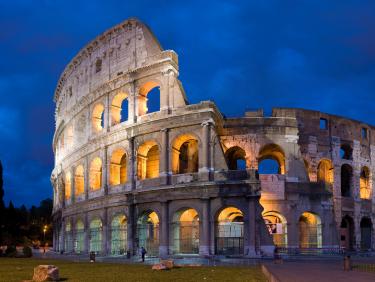Faculty of Modern Languages Italian / Romance Studies
Romance studies considers Romance languages, literature and cultures. In Italian, the focus is on the Italian-speaking world (in particular Italy, Ticino).
Romance studies covers research and teaching across Romance languages, literature and cultures. The most important Romance languages, which all derive from Latin, include French, Spanish, Italian, Portuguese, Romanian, Occitan, Catalan, Gaelic, Sardinian and Rhaeto-Romanic. Variants of these Romance languages and their corresponding literatures are also found outside Europe, in areas including Latin America, North America, and Africa.
Degree courses in Italian encompass Italian language, literature, and cultural studies. In addition to this content, students attend language sessions which are taught exclusively by native speakers.

Special Features and Characteristics
- Heidelberg University has ERASMUS agreements with fourteen universities in Italy (among others Bologna, Florence, Rome)
- a connection to the Italian Center Heidelberg and to the related programme of scientific and cultural activities
- internal and external links with different research centres, for example the European Linguistics Centre (Europäischen Zentrum für Sprachwissenschaften, EZS)
- numerous international research partners
- specific formats for courses conducted in the target language
Research
Research at Heidelberg University is conducted in the fields of linguistics, literary studies, and cultural studies:
The main research interests in Italian linguistics are:
- Everyday Italian language
- Syntax in spoken Italian
- Resources for interaction (language, gesture, eye contact)
- Methods for field research and data collection
- Language and dialect contact
- Italian place names and surnames
Research specialisms within Italian literary studies and cultural studies:
- “Why literature?” Aesthetic competencies
- (Musical) theatre from the Enlightenment to the present day - between theory and practice
- Novels and short prose, poetry and canzones (from the Trecento and Rinascimento, and with a particular focus on the modern period and present day)
- Italian cinema, film, and series (TV, online)
- Literature and media theory, including theories of affect, form, and genre
- Cultural studies theories, popular culture and Mediterranean studies
Occupational Areas
Graduates of a degree programme in Italian may pursue a career in the following fields:
- teaching (German secondary school – Gymnasium)
- training and consulting institutions
- universities and research institutes
- media
- communications and translation
- publishing
- tourism
- and other fields in which knowledge of the Italian language, literature and culture is of benefit.
Insights

I study Italian with European art history because I have Italian roots and want to find out more about my heritage. The Italian language also makes it easier for me to delve deeper into art history.
Marco Vedana, 34, Italian/Romance studies, 2nd semester Bachelor



